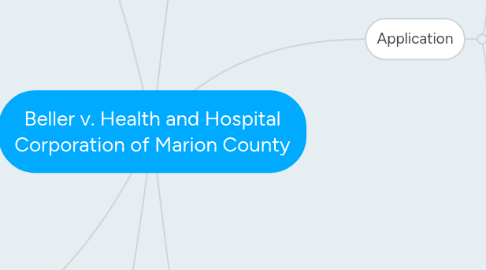
1. Conclusion
2. Rule
2.1. Negligence
2.1.1. Existence of a Duty of Care
2.1.2. Breach of Duty of Care
2.1.3. Legal Injury
2.1.4. Defendants breach of duty of care directly resulted in the injury
2.2. EMTALA
2.2.1. Federal law created in 1986
2.2.2. Requires a provider in an emergency department to stabilize and treat all patients that come to the ER
2.2.3. This requirement applies regardless of the patient's ability to pay or the status of their insurance coverage
2.2.4. Applies in emergency situations, in which the patient's health condition is severe and the absence of immediate medical attention could result in serious issues to the patient's health
2.2.5. CMS previously defined the meaning of a person deemed to "come to an emergency room." This definition was amended in 2003 after the incident in question.
3. Facts
3.1. Parties
3.1.1. Health and Hospital Corporation of Marion County/ Wishard Memorial Hospital (Defendant)
3.1.2. Melissa Welch and Joshua Beller (Plaintiffs)
3.2. Background
3.2.1. Melissa Welch was 34 weeks pregnant
3.2.2. On June 14, 2011 Melissa called 911 because her water had broke and a Wishard ambulance was sent to get her
3.2.3. She had a prolapsed umbilical cord. The paramedics tired to relieve pressure, but were unsuccessful.
3.2.4. After consulting a nurse at Melissa's OBGYN office, the paramedics determined that Melissa should be transferred to a hospital.
3.2.5. The paramedics transferred her to Beech Grove Hospital, however they did not have an obstetrics facility.
3.2.6. She was briefly examined at Beech Grove before being sent to St. Francis Hospital South.
3.2.7. Joshua Beller was born by C-Section at St. Francis, however he suffered hypoxia-induced brain damage.
3.3. Procedural History
3.3.1. Melissa Welch and Joshua Beller sued Wishard claiming that they violated EMTALA by transferring him rather than delivering him.
3.3.2. The suit claims that the failure to deliver Joshua directly led to his permanent brain damage.
3.3.3. The district court ruled that the 2003 agency rule was a clarification and could be retroactive. As a result, they ruled in favor of the defendant.
4. Application
4.1. EMTALA
4.1.1. At the time of the incident, a patient was deemed to have "come to the emergency room" if they had an emergency situation and were on the hospital property.
4.1.1.1. Hospital property was defined to include ambulances owned and operated by the hospital.
4.1.1.1.1. Using this definition, the plaintiffs clearly had "come" to the hospital.
4.1.1.1.2. Therefore, Wishard Memorial Hospital had a responsibility to treat and stabilize them under EMTALA.
4.1.1.1.3. This responsibility would constitute a duty of care.
4.1.1.2. Melissa Welch and Joshua Beller clearly had an emergency situation.
4.1.2. In 2003, CMS amended the definition of when a patient was deemed to have "come to the emergency situation.
4.1.2.1. Still considers hospital property as including ambulances owned and operated by the hospital.
4.1.2.2. Creates exceptions that a person is not deemed to have come to the emergency room of the hospital that owns the ambulance if the ambulance is operated under community wide EMS protocols that direct it to transport the patient to another hospital. That hospital instead would instead have the duty of care to the patient under EMTALA.
4.1.2.2.1. The Wishard ambulance was operating under community EMS protocols at the time it transported to the plaintiffs to Beech Grove.
4.1.2.2.2. Using this definition, the plaintiffs did not "come" to the defendants.
4.1.2.2.3. Therefore, the defendants wouldn't have a responsibility to treat and stabilize them under EMTALA.
4.1.2.2.4. If EMTALA didn't apply to the defendants, then they did not have a duty of care to the plaintiffs and could not be found liable for negligence.
4.2. Negligence
4.2.1. Did the defendant have a duty of care?
4.2.1.1. Can the 2003 definition be applied retroactively to apply to this situation? -
4.2.1.1.1. A new rule cannot be retroactive unless Congress has provided the agency with the authority to do so.
4.2.1.1.2. If a rule is merely a clarification of confusing or unsettled issues, then it is treated differently and can apply retroactively.
4.2.1.2. Did EMTALA responsibility apply to the defendant?
4.2.1.2.1. No, therefore they did not have a duty of care to the plaintiffs and cannot be found negligent.
4.2.2. Given that the defendant did not treat and stabilize the plaintiffs, they breached their duty of care if they had one under EMTALA.
4.2.3. Joshua suffered permanent brain damage, a legally recognized injury.
4.2.4. This injury was the direct result of the failure to treat and stabilize the plaintiffs.
5. Impact
5.1. Court cases that cite this case
5.1.1. Patterson v. Colvin
5.1.2. Gillispie v. Regionalcare Hospital Partners Inc.
5.2. Why health professionals care
5.2.1. Clarifies scope of EMTALA
5.2.2. Impacts potential medical liability and negligence torts against hospitals and providers.
5.3. Health care practices resulting from the case
5.3.1. More community EMS agreements
5.3.2. Expansion of hospitals owning there own ambulances to get reimbursed for transportation of patients in areas that they don't have a hospital, but not have EMTALA responsibility.
6. Issue
6.1. Did Melissa Welch and Joshua Beller "come" to the emergency room of Wishard Memorial Hospital when the ambulance transported them there?
6.1.1. Which definition of "come" should apply?
